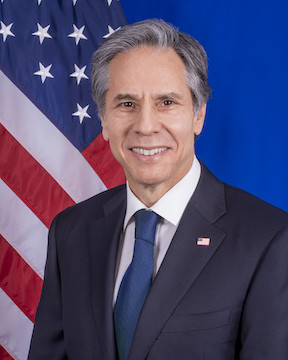Blinken raises US concerns on unfair trade practices in China
Secretary of State Antony Blinken raised concerns over unfair trade practices in the world’s No. 2 economy as he began talks in China, with the threat of US sanctions on Beijing for its support of Russia looming over his visit.
“We have an obligation for our people — indeed an obligation to the world — to manage the relationship between our two countries responsibly,” he told Shanghai Party Secretary Chen Jining on Thursday morning, after attending a basketball game the night before.
Blinken stressed that US firms need a level playing field in China and brought up “non-market economic practices” in the Asian nation during the meeting, according to State Department spokesperson Matthew Miller.

The economic hub’s leader said their nations had a choice between “cooperation or confrontation,” with the outcome affecting the “future of humanity.” Blinken is also set to hold talks with American business leaders in Shanghai before heading to Beijing for meetings on Friday, including a possible face-to-face with President Xi Jinping.
Beijing pushed back against the trade criticisms on Thursday, saying its practices are in line with international rules. It urged Washington to cooperate in developing steady US-China business ties, according to Foreign Ministry spokesman Wang Wenbin at a regular press briefing in Beijing.
The top American diplomat’s trip comes amid heightened bilateral tensions, as the hawkish US election season tests a stabilization in ties brokered by Xi and President Joe Biden last year. The US leader last week blasted Beijing as “xenophobic,” vowed more tariffs on China and opened a probe into the Asian nation’s ship industry.
Blinken will try to convince Chinese officials to halt trade that has enabled Russia’s defense industrial base to rebuild despite Western curbs imposed after its invasion of Ukraine. Also on the agenda are Beijing’s territorial claims over the self-ruled island of Taiwan and its aggression in the South China Sea, a senior US official said.
The Communist Party’s response to the prospect of sanctions and a recent barrage of trade salvos has been limited to tough talk and symbolic tit-for-tat tariffs. Xi is trying to woo foreign investors back to China and reinvigorate the world’s No. 2 economy, as it battles a property crisis and a trade probes from the European Union.
“You often see the most activist Chinese response at times when they’re feeling empowered and strong,” said Jude Blanchette, an expert on China and foreign investment at Washington’s Center for International and Strategic Studies. “Right now, the leadership in Beijing is having to put out a lot of fires.”
Adding to those concerns is the threat of new sanctions. Earlier this month, Treasury Secretary Janet Yellen told officials in Beijing that Chinese banks helping Russia’s war effort could face fresh US sanctions, as she raised concerns to top leaders about China’s overcapacity. Ahead of Blinken’s visit, Chinese state media called out the contradiction in trying to stabilize ties while ramping up trade rivalry.
“Why does the US side turn a normal visit into what seems like an ultimatum?” the Communist Party’s Global Times newspaper wrote in an editorial. “If this issue is not resolved, it is like walking at night blindfolded and it will easily lead to mistakes and even danger.”
Blinken landed in China just hours after the Senate passed a $95 billion emergency aid package for Ukraine, Israel and Taiwan, which could also lead to the ban of popular video-sharing app TikTok unless it divests from its Chinese parent company ByteDance Ltd. Biden signed the package into law on Wednesday.
The US delegation will seek to clearly communicate policies to Beijing in order to prevent any escalation of tensions. In recent weeks, the US met with European and Asian allies to discuss China. Blinken’s trip also coincides with the US and Philippines conducting military exercises near the disputed South China Sea and Taiwan.
US officials are unlikely to walk away from meetings this week with many concrete breakthroughs or deliverables. While there are signs the relationship has stabilized, the two countries have continued to dispute over issues spanning trade, technology, human rights, Ukraine, North Korea and the Middle East, where Blinken has sought to enlist Beijing’s help to pressure Iran.
Calling US-China ties “consequential” for the whole world, Blinken stressed the importance of sending more Americans to study in the Asian nation, during a talk at New York University Shanghai. The US has gone from 15,000 students a decade ago to just 800, he added.
“That’s a really important way to make sure that we avoid miscommunications and misperceptions,” Blinken said, of academic exchanges, “even where we have profound differences.”
Similar Stories
United States and Norway issue innovative report creating greater transparency in critical mineral supply chains
Today, the U.S. Department of Commerce and the Norwegian Ministry of Trade, Industry, and Fisheries issued a thorough, innovative report presenting our shared understanding of non-market policies and practices (NMPPs)…
View ArticleDecember CNBC/NRF retail monitor results show strong growth boosted by final Thanksgiving weekend days
Retail sales jumped strongly in December, boosted in part by two busy holiday shopping days during Thanksgiving weekend falling in the final month of the year, according to the CNBC/NRF…
View ArticleNAW presents Dirk Van Dongen Lifetime Achievement Award to Bergman, CEO of Henry Schein, Inc.
At the 2025 NAW Executive Summit Gala on January 28 in Washington, D.C.
View Article
St. Louis region’s chemical industry welcomes new investment
View Article
Navigating compliance: Adapting to changing Customs regulations in global supply chains
View Article
December 2024 U.S. Transportation Sector Unemployment (4.3%) Was the Same As the December 2023 Level (4.3%) And Above the Pre-Pandemic December 2019 Level (2.8%)
View ArticleGet the most up-to-date trending news!
SubscribeIndustry updates and weekly newsletter direct to your inbox!





